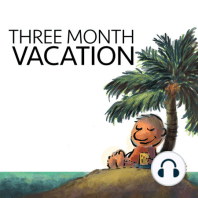18 min listen

Getting Things Done: The Trigger
Getting Things Done: The Trigger
ratings:
Length:
18 minutes
Released:
Jan 23, 2015
Format:
Podcast episode
Description
Getting things done isn't as easy as it looks. So what gets in our way when we run our small businesses? Do we simply run out of ideas? The Three Month Vacation Podcast examines how to get out of your own way and get your online?or offline business working smoothly. The key to getting things done is the trigger. How do you create and sustain that trigger in your small business? To get hidden goodies, go to http://www.psychotactics.com/magic To also get the coolest headline report on "why headlines fail", go to http://www.psychotactics.com Time Stamps: 00:00:20 Getting Things Done: 00:02:08 How Do We Make The Trigger Work? 00:04:03 Table of Contents 00:04:24 How To Activate The Trigger 00:09:29 How The Trigger Builds Momentum 00:14:33 Summary 00:17:47 Final Transcript: When I was little my uncle gave me a game. It was called Snoopy Tennis and it was a little console, a video game from Nintendo. All you had to do was play tennis. Lucy from Peanuts and Charlie Brown from Peanuts as well, they would hit the ball towards you and you as Snoopy had to return the service. Lots of people played those games. Millions of kids played those games across the globe, but mine was different, mine was unique. My console had a crack in it. It had fallen at some point in time, so I can see the ball heading towards me and I have to listen for it. It would go beep, beep, beep, and then I had to push down on the red button that would ensure that I hit the ball, got the service back over the net as it were. What was interesting was that I wasn't looking for the visual anymore. I was listening to the sound and responding. That sound was a trigger. One of the biggest reasons why we can take as much time off as we do is because we have these triggers in place. Without the triggers it's very hard for us to get anything done. That is because as adults we have so many things to do and so many responsibilities that when we try to do something, when we try to finish a book or write an article or do anything at all, we struggle. We struggle because we don't have that trigger in place. What is that trigger and how can we make it work for ourselves? Let's start with the things that I don't like very much. One of the things that really bug me is having to exercise. As I've mentioned before, I don't care much for exercise, and yet you'll notice that I'm reasonably fit. This is because I end up doing between 80,000 to 100,000 steps a week. You have to ask yourself how does someone who doesn't like exercise doing such a lot of walking. Well, I use a trigger. In fact, two triggers. The first trigger is just the coffee. that is when I get up in the morning I am not headed for a walk, I am headed for a coffee. I'll wake up, I'll get my iPhone on, put on the audio, and then head towards the café. When I reach the café that's my reward. What's really happening here is that the walk is not something that appeals to me that much. However, the coffee does appeal to me. That sense of reward, that carrot and stick as it were, is what helps me. That's the trigger. The second trigger that I have in place is I have a little pedometer called Fitbit. I have other friends who are also high achievers who do 70, 80, 100,000 steps a week. I want to compete against them so that becomes my second trigger. What I'm saying here is that I don't care much for walking. I would rather sit here and do a podcast and do some music and draw some cartoons, and do all kinds of stuff. Yet no matter what the weather, whether it's rainy or windy or hot or cold, I end up going for a walk - and that is because of the trigger. Triggers work both ways. They work for good and evil. What we are covering in today's episode are three things. The first is how to activate the trigger. The second is how it helps you build and sustain momentum. This is very important. The third thing is what happens when you go offtrack. How do you get back on track? Let's start off with the first one, which i
Released:
Jan 23, 2015
Format:
Podcast episode
Titles in the series (100)
Getting Things Done: The Trigger: Getting things done isn't as easy as it looks. So what gets in our way when we run our small businesses? Do we simply run out of ideas? The Three Month Vacation Podcast examines how to get out of your own way and get your online?or offline business... by The Three Month Vacation Podcast